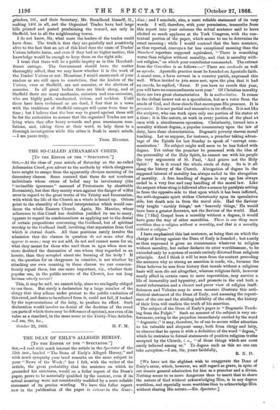THE SO-CALLED ATHANASIAN CREED.
[To THE EDITOR OF THE " SPECTATOR."] SIR,—At the close of your article of Saturday on the so-called Athanasian Creed, you advert to the methods by which clergymen have sought to escape from the apparently obvious meaning of its damnatory clauses. Some contend that these do not condemn individuals whose errors of belief may be involuntary (the " invincible ignorance " assumed of Protestants by charitable Romanists), but that they merely warn against the danger of wilful error in regard to the great truths of the Trinity and Incarnation, with which the life of the Church as a whole is bound up. Others point to the absurdity of a literal interpretation which would con- demn the whole Eastern Church. Again, Mr. Maurice, whose adherence to this Creed has doubtless justified its use to many, appears to regard its condemnations as applying not to the denial of certain propositions concerning the Godhead, but of spiritual worship to the Godhead itself, involving that separation from God which is eternal death. All these positions surely involve the admission that the clauses in question do not ?neon what they appear to mean; may we not add, do not and cannot mean for us, what they meant for those who used them in ages when men no more doubted the damnation of one whom they regarded as an heretic, than they scrupled about the burning of his body ? If so, the question for us clergymen to consider, is not whether by attaching our own meaning to these clauses we can conscien- tiously repeat them, but one more important, viz., whether their popular use, in the public service of the Church, has not long become utterly unreal?
This, it may be said, we cannot help, since we are legally obliged to use them. But surely a declaration by a large number of the clergy that they adhere under protest to the public recitation of this creed, and desire to be relieved from it, could not fail, if backed by the representations of the laity, to produce its effect. Such declaration would involve no denial of the doctrine of the creed (on parts of which there may be difference of opinion), nor even of its value as a standard, in the same sense as the Thirty-Nine Articles. —I am, Sir, &c.,


































 Previous page
Previous page